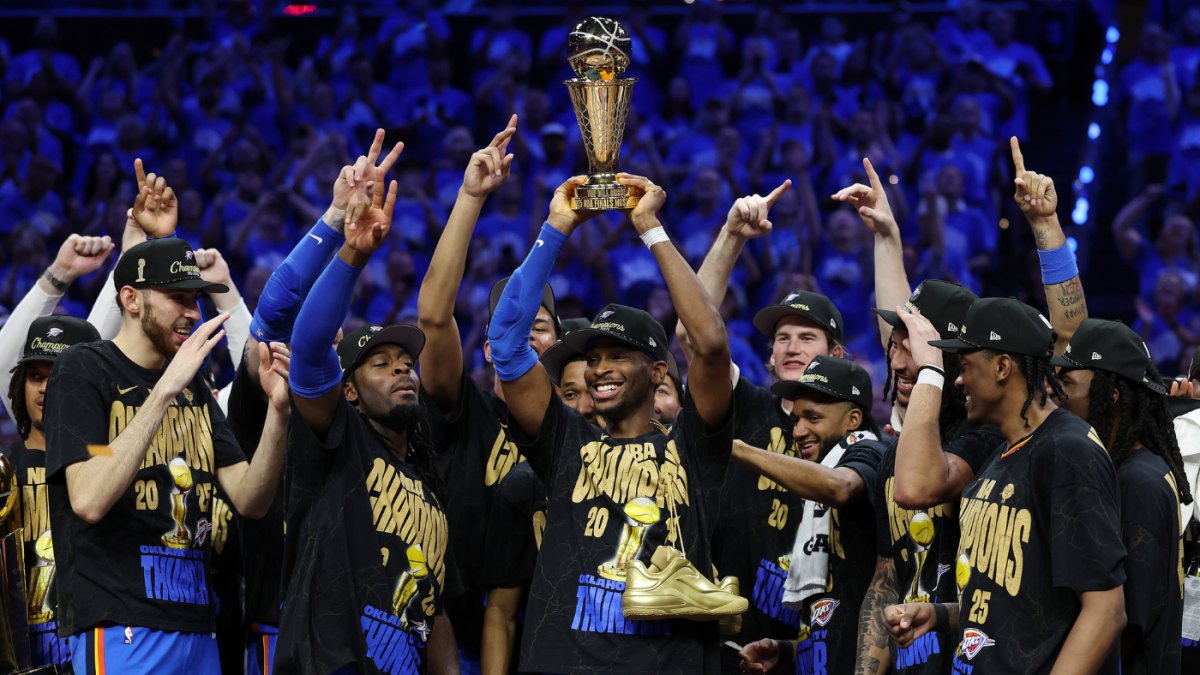

What makes an all-time NBA team? Is it a roster filled with all-time talent? Is it a pure numbers game: wins, point differentials, efficiency rankings, etc.? The 2015-16 Golden State Warriors would like to know if failing to finish an all-time season with a title excludes you from this conversation.
That’s an important word. Conversation. That’s all this is. We can’t line up the Jordan-Pippen Bulls against the Curry-Thompson Warriors and actually find out which team was better. What we can say is both these teams, and certainly a handful of others, are in the all-time conversation.
And now our question is this: Does this Oklahoma City Thunder team that just defeated the Indiana Pacers in seven games for the 2025 NBA title belong as well?
From a dynastic standpoint, it’s obviously premature to answer yes to that question. There’s no doubt that the Thunder — as the youngest team to win a championship since the 1977 Trail Blazers, and with a league-high 13 first-round draft picks in their war chest between now and 2031 — are set up to win multiple titles. But until they actually do, which will be easier said than done in what has become the deepest and most equitable landscape in NBA history, particularly in the Western Conference, they cannot be in that conversation.
But from a single-season standpoint? That’s a different conversation, and through any sort of objective lens, it would be almost impossible to keep the Thunder out of it. To put OKC’s place in history into perspective, let’s start with some numbers and then go from there.
84
Only four teams in history have topped the 68 regular-season wins that Oklahoma City piled up this year. Add the 16 postseason wins, and that’s 84 total victories. Only two teams have surpassed that number, and one of them, the 2015-16 Warriors, who won 88 games after a record-setting 73-win regular season, didn’t finish the deal with a championship. The other was the ’95-96 Bulls, who won 87 games (the ’96-97 Bulls matched OKC’s 84 wins).
There’s some important context here. The NBA didn’t go to seven-game series in all four playoff rounds until 2003. Prior to that, the first round was only a five-game series, and prior to 1984, there were only three playoff rounds in total.
So those ’90s Bulls teams, for instance, would’ve had a chance to add one more victory if their first-round series would have been best-of-seven. Not a huge deal, but still relevant. A team like the ’66-67 76ers, who won a total of 79 games, would’ve had to win five more games to win the title as there is now a full extra round and they are all best-of-seven.
All of this is to say, if you chalk up 84 wins and finish it off with a championship, you are in the rarest of historic air, whatever “era” context you would like to invoke notwithstanding. But it goes deeper, as not only did OKC win a lot of games, but it won them by historic margins.
12.9
This was OKC’s average per-game point differential in the regular season, and it’s the largest in NBA history. The previous record, 12.3 by the 1971-72 Lakers, stood for more than a half century. Below are the top five regular-season point differentials.
|
Team |
Point differential |
Title? |
|
2024-25 Thunder |
+12.9 |
Yes |
|
1971-72 Lakers |
+12.28 |
Yes |
|
1970-71 Bucks |
+12.26 |
Yes |
|
1995-96 Bulls |
+12.24 |
Yes |
|
2016-17 Warriors |
+11.3 |
Yes |
1,247
This was Oklahoma City’s total point differential for the regular and postseason combined, and it’s also an NBA record. This number included:
- 63 wins by at least 10 points (most in NBA history)
- 40 wins by at least 15 points (most in NBA history)
- 12 wins by at least 30 points (most in NBA history)
- 4 playoff wins by at least 30 points (most in NBA history)
It worked the opposite way, as well, which is to say when the Thunder weren’t building their own big leads they were erasing those of their opponents. In the regular and postseason, OKC went 19-12 in games it trailed at halftime. That is the seventh-best come-from-behind win percentage in NBA history.
16
With a 68-14 regular-season record, the Thunder finished 16 games ahead of the second-seeded Rockets in the Western Conference. That is the biggest gap between a No. 1 and No. 2 seed since the 1977 merger.
|
Team |
Games ahead |
|
2024-25 Thunder |
16 |
|
2023-24 Celtics |
14 |
|
2012-13 Heat |
12 |
|
2005-06 Pistons |
12 |
|
1995-96 Bulls |
12 |
Historic defense
The Thunder are the first team since the 2014-15 Warriors to win the title with the league’s top-ranked defense, and the only team since the 1976-77 merger to lead the league in defensive rating (106.6), opponent field goal percentage (43.6%) and opponent turnovers per game (17.0).
Including the postseason, here are some more numbers to chew on.
- 18: OKC’s postseason turnovers created per game, the most since the 1996 Bulls (minimum 15 games)
- 16.4: OKC’s postseason steals+blocks per game, the most since the 1983 Lakers (minimum 15 games)
- 1,689: OKC’s total steals+blocks for regular and postseason combined, the most since the 1981-82 76ers (1,813)
- 10.7: OKC’s postseason steals per game, the most since the 1975 Warriors (minimum 15 games)
- 247: OKC’s total postseason steals, an NBA record
- 1,094: OKC’s total steals for regular and postseason combined, fifth most all-time
- 131: OKC’s total postseason turnover margin, an NBA record
- 62: OKC’s number of games (regular and postseason) with at least 10 steals, seventh most all-time
- 468: OKC’s total postseason deflections, 100 more than any team over the last decade
- 2.5: The Thunder defense finished 2.5 points per 100 possessions better than the next-best defense (Orlando was 109.1). That is the second-biggest gap over the last 25 seasons. Only the 2015-16 Spurs were better with their 98.2 defensive rating registering 2.6 points/100 possessions better than the 100.8 Atlanta Hawks.
The MVP season by Shai Gilgeous-Alexander notwithstanding, defense was this OKC team’s superpower. The Thunder weren’t going to shoot you out of the gym, but when they locked in defensively, it was an avalanche. In Game 5 against Indiana, the Thunder became the first team to record at least 15 steals and 12 blocks in a single Finals game since those two stats started being tracked in 1974.
Even crazier? The Thunder carded at least 10 steals in an NBA-record 15 games this postseason. Next on the list are the 1977 Trails Blazers with 12 such games and the 1985 Lakers with 10.
Ten steals in an NBA game is a major number to card. The Thunder did it 65 times in the regular and postseason combined. Only six teams in history have ever topped that mark.
Now, to pile up 10 steals in a playoff game is even harder, by the very nature of facing the best teams in the league. To get to this number in even a couple playoff games would be an achievement. To reach that mark in 65% of your playoff games, as the Thunder did (15 out of 23) is almost hard to fathom.
The officials allowed defenses to play extremely physically in these playoffs, and the Thunder, already an inordinately disruptive defense, used these conditions to constrict the life out of opponents in a way we haven’t often seen in the NBA.
SGA’s all-time season
If you’re going to be talked about as an all-time great team, it’s basically a requirement to have an all-time great player. As stated above, we can’t call the 2024-25 Thunder an all-time great team yet, but we can say they had an all-time great season.
Likewise, it’s too early to stamp Shai Gilgeous-Alexander with the all-time great label, but from a single-season standpoint, few have topped what he did this year when he became the fourth player in history to win MVP, the scoring title and Finals MVP in the same season. Suffice it to say, he’s in some pretty good company.
CBS Sports
A few more SGA notes for you …
- 12 playoff games with 30+ points and 5+ assists, an NBA record
- 10 straight 30-point home playoff games, an NBA record (passing Wilt Chamberlain)
- 15 playoff games with at least 30 points, third all-time (Michael Jordan & Hakeem Olajuwon had 16)
- 212 Finals points, third most all-time (Shaquille O’Neal had 228 in 2000, LeBron James had 218 in 2015)
All season long, Gilgeous-Alexander was the standard for scoring. Combining the regular and postseason, he led the league in 20-point games (95, tied with ’90-91 Jordan for most all-time), 30-point games (64), 40-point games (14) and 50-point games (4). Also, SGA’s 32.7 PPG this regular season is the highest scoring output in history on a championship team.
|
Season/team |
Player |
PPG |
|
2024-25 Thunder |
Shai Gilgeous-Alexander |
32.7 |
|
1992-93 Bulls |
Michael Jordan |
32.6 |
|
1970-71 Bucks |
Kareem Abdul-Jabbar |
31.7 |
|
1990-91 Bullls |
Michael Jordan |
31.5 |
All of this is to say nothing of SGA ranking second in total regular-season steals and postseason steals. He is an all-time one-on-one scorer with a merciless midrange game and the best driver in the world. And way you break this thing down, Gilgeous-Alexander just put together one of the great single seasons in NBA history, as did the Oklahoma City Thunder.
This news was originally published on this post .






Be the first to leave a comment